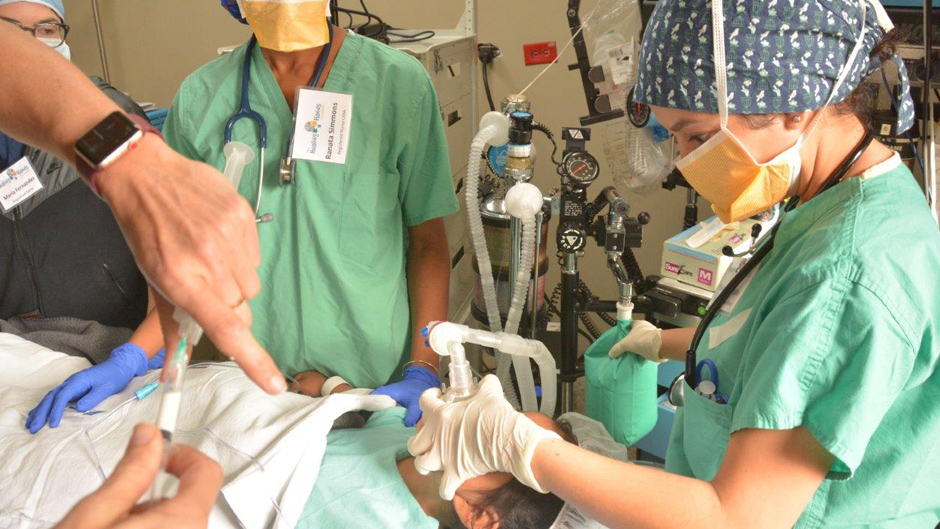While most of her peers back at the University of Miami were studying, Viviana Castillo was bouncing up mountainous roads on a bus bound for Guatemala’s central highlands region. It took four hours to reach the final destination: Hospital Corpus Christi Patzún Chimaltenango, operated by area nuns.
Castillo was accompanying School of Nursing and Health Studies faculty member Nicole Gonzaga, assistant professor of clinical, on a medical mission trip led by the Healing Hands Foundation, which provides critical surgeries and dental care free of charge in underserved regions.“
The School of Nursing and Health Studies (SONHS) should embrace this opportunity and the connections Dr. Gonzaga has brought because it’s just a great experience,” says Castillo, who will graduate in December from the school’s Doctor of Nursing Practice Nurse Anesthesia track program.
Launched in 2014, the school’s very competitive BSN-DNP degree enables post-baccalaureate nurses the opportunity to earn a doctoral degree in three years and prepares them to become certified registered nurse anesthetists (CRNA). The program emphasizes clinical excellence, placing students in a wide range of health care settings. By the time Castillo traveled to Guatemala in October, she had completed clinical rotations at 10 different South Florida sites, including Miami’s VA Hospital, Joe DiMaggio Children's Hospital, and Ryder Trauma Center.
She was the first SONHS student selected for the opportunity with Healing Hands, notes Gonzaga, but she won’t be the last. “Viviana is wonderful,” says Gonzaga, DNP, MS, CRNA, ARNP. “She came to work and to learn, and she was flexible with every aspect of the mission. The Healing Hands Foundation board members were so pleased with her that they want two student RNAs to come on the 2019 Guatemala Medical Mission.”
Castillo says the Healing Hands crew provided top-notch care over their four days at Hospital Corpus Christi, correcting birth defects with plastic surgery, performing hysterectomies, and conducting other life-changing procedures. “I think the total number was like 86 surgeries, and the dental team performed around 130 dental cases,” she recalls. “It was pretty significant.”
Castillo elected to devote her time to the pediatric operating room, where procedures ranged from repairing inguinal hernias to performing circumcisions. During the brief trip, she assisted with anesthesia on some 30 pediatric cases, all under the supervision of the attending anesthesiologist, CRNAs, and Gonzaga.
In addition to the hands-on experience, Castillo says she gained valuable perspective. “You have to roll with the punches,” she explains. “A lot of surgeries get moved around and cancelled, and you have to be able to be flexible and adapt quickly to whatever may come up.”
Speed was also a factor. “We moved pretty fast. While I was bringing the patient out, someone else was taking care of cleaning and setting up for the next case, so I’d come back with the next kid ready to go,” she recounts.
Then there was the matter of transporting the kids. There weren't enough stretchers to go around, so instead of wheeling young patients into recovery, Castillo carried them in her arms or even piggy-back style—often breaking out in a big smile. After all, the opportunity for one-on-one connections with patients was one of the main reasons she decided to become a CRNA. “You focus on one patient at a time. You’re there the whole time monitoring them, and then you get to see them wake up and feel comfortable,” she explains.
Castillo’s motivation to become a health provider grew out of another personal connection. “My mom had breast cancer—she’s fine now; she’s healthy. But I remember driving to Sylvester Comprehensive Cancer Center with her after her surgery. She was so sore I had to help her shift the gears,” she recalls. “I knew then that health care would be the profession for me; I just didn’t know what path I would take.”
Before starting her full-time doctoral program at the SONHS in 2016, Castillo had volunteered on half a dozen medical mission trips to Haiti. But this trip was different. Thanks to her education, she was able to do more advanced procedures. And Guatemala’s geography, people, food, and culture struck a familiar chord in Castillo. It all reminded her of Nicaragua, the country where she was born and lived until the age of 10. "It felt like I was helping at home,” she says. “So that was really rewarding.”

